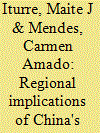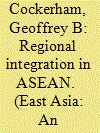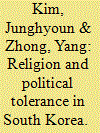| Srl | Item |
| 1 |
ID:
095474


|
|
|
|
|
| Publication |
2010.
|
| Summary/Abstract |
War reconciliation and cultures of memory themes continue to receive high attention but despite the long list of newly released books praising Germany which has been thought to be more prone to experience guilt and from it ensuing war responsibility for its past than the Japanese nation in the aftermath of World War Two [46], the long shadows of the past are still prevailing in both countries. Even if Germany scores better then Japan from a comparative perspective this does not mean that Germany has internally resolved the problems related to its past once and for all. Yet, the slave labor compensation legislation in Germany which was meant to definitely settle the accounts with the past has shown that lasting war reconciliation is possible. The unwillingness of Japanese Government officials to admit past wrongdoings, to apologize for coerced war prostitution and to refuse to compensate former slave laborers has put Japan on the frontline of international criticism. The claim that Japan as a nation has not learned from history is critically re-assessed against the backdrop of bottom up NGO reconciliation activities and lawmaker efforts to enact legislation aimed at resolving the comfort women issue. In contrast to conventional explanations it is argued that different circumstances, influenced by distinct historical and political factors in each country, resulted in different approaches. In Germany the social protest movements led to the institutional birth of the Green Party. The Greens initiated the reconciliation process for former slave laborers and changed the political landscape from the bottom. In Japan the social protest movements did not succeed to settle as a novel political force. Thoughtlessness, ignorance, conspiracy of silence, "double victimization" stigma, "negative pacifism" and the reluctance to address the war guilt issue prevented a public discussion. It is then sought to answer the question: Why do people repress or deny past wrongdoings despite knowing the facts? It is looked at how consecutive generations in Germany and Japan have coped with guilt and shame feelings in different ways. The article concludes that war reconciliation similar to restorative justice is an ongoing, never-ending process. The emotional part of reconciliation which goes far beyond words of apology, judicial punishment or monetary compensation and does not necessarily lead always to positive outcomes is given particular attention. Ways of civil society bottom-up reconciliation in Germany and Japan are explored.
|
|
|
|
|
|
|
|
|
|
|
|
|
|
|
|
| 2 |
ID:
095473


|
|
|
|
|
| Publication |
2010.
|
| Summary/Abstract |
This paper analyses the Chinese quest for energy resources in Latin America, arguing that the strengthening of relations in this sector can only be explained by a conjunction of interests on both sides. Looking at the presence of Chinese national oil companies in the regional energy sector, we show that China's incursion has allowed the region to shift its traditional energy partners, introducing a factor of change into economic and political relations with geopolitical implications for the regional arena.
|
|
|
|
|
|
|
|
|
|
|
|
|
|
|
|
| 3 |
ID:
095475


|
|
|
|
|
| Publication |
2010.
|
| Summary/Abstract |
This paper investigates regional integration in the Association of Southeast Asian Nations (ASEAN) by analyzing the agreements developed within the ASEAN framework since its founding in 1967. This examination reveals that, although integration in ASEAN is certainly influenced by norms and values, the integration process can be best understood by intergovernmentalism. While many agreements have been developed within the ASEAN framework and have become more legalistic in nature, they tend to mostly be in functional areas and exhibit low levels of transparency and delegation. The design of ASEAN is indicative of an overriding concern for state sovereignty as a key strategic interest for member states.
|
|
|
|
|
|
|
|
|
|
|
|
|
|
|
|
| 4 |
ID:
095476


|
|
|
|
|
| Publication |
2010.
|
| Summary/Abstract |
This paper examines the relationship between individuals' religiosity and its impact on political tolerance in South Korea. Based on the results of survey data analysis, we find that there are inter-denominational as well as intra-denominational differences of religiosity that influence levels of political tolerance among South Koreans. In terms of the inter-denominational differences (the ethnoreligious thesis), we find that Buddhists tend to be more tolerant than Protestants, and Protestants tend to have the lowest level of political tolerance in South Korea. In terms of the intra-denominational differences (the culture wars thesis), religious traditionalists have a lower level of political tolerance than religious modernists in South Korea. This paper argues that there is a statistically significant relationship between individuals' religiosity and their level of political tolerance, and that a composite model (combining the ethno-religious model and the culture wars model) is the best way of investigating such a relationship in the Korean context.
|
|
|
|
|
|
|
|
|
|
|
|
|
|
|
|
| 5 |
ID:
095479


|
|
|